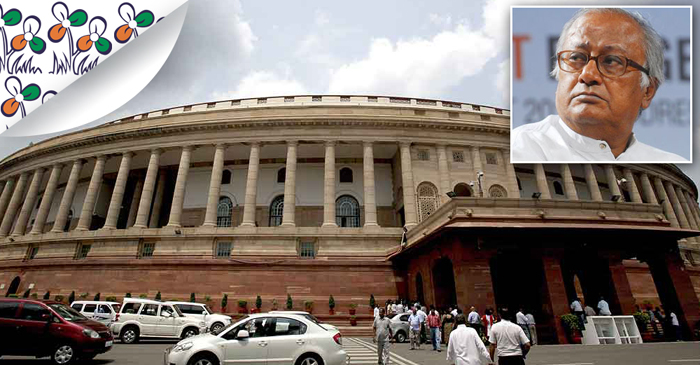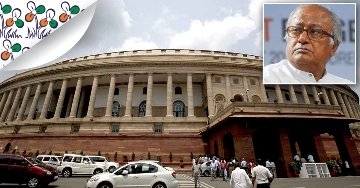Full Transcript
Mr. Deputy-Speaker, Sir, I rise to take part in the discussion on the Demands for Grants of the Human Resource Development Ministry. Once upon a time it used to be called the Education Ministry.
This Government, through the President’s Address at the beginning of this Session, had declared that education was going to be the priority of priorities. But from the allocations that we see in this budget it appears that education is the least of the priorities of this Government.
There have been savage cuts in the allocations for both the Department for School Education and Literacy as well as the Department of Higher Education. The Standing Committee Report of the HRD Ministry, which was tabled in Parliament yesterday, has shown that the plan allocation for School Education and Literacy has been reduced by “a whopping 24.68 per cent.”
The non-plan allocation has also come down. So far as the Department of Higher Education is concerned, the plan allocation has been reduced quite dramatically and there is a marginal increase in the non-plan allocation. The Standing Committee Report shows that overall there has been a decrease of Rs 799.74 crore in the budget of the Department of Higher Education.
Now, I was wondering why this is happening. Why is the Government acting against its declaratory promises? It seems to me that the Finance Minister was punishing the Human Resource Development Ministry. I cannot understand why the children and youth of our country are being punished for the poor functioning of the Human Resource Development Ministry.
I know that this Government will say that some allocations have been cut because following the recommendations of the 14th Finance Commission, more funds have been devolved to the States. But that does not justify the slashing of the Budget for flagship schemes in the field of education, such as Sarva Shiksha Abhiyan, Mid-day Meal Scheme etc. If you look at the percentage cuts in these sectors, the budget in Sarva Shiksha Abhiyan has been cut by more than 20 per cent and in the Mid-day Meal, the cut is more than 30 per cent.
Sir, I was not showing any disrespect and there is no question of taking back what I have said. I have actually read the reports of the Standing Committee very carefully. Do you know what the Standing Committee has said? It has said that it has found that the Human Resource Development Ministry was helpless. These are not my words. I am not casting any aspersion. They seemed helpless in the face of the cuts imposed by the Finance Ministry. I am going by what this Parliamentary Standing Committee has said about the Demands for Grants of the Human Resource Development Ministry.
Unfortunately, I have to say that the catchphrase ‘cooperative federalism’ is being reduced to a convenient pretext for the complete abdication of the responsibility by the Centre in fulfilling its commitment in the social sector. So far as school education and literacy is concerned, the flagship programmes have been cut. I know that in past few years, we have had success in terms of enrolment; our children are being enrolled but they are not being educated.
We have cause to worry about the quality of education because the outcome in terms of language and arithmetic skills are extremely poor once you reach the upper primary level and the drop-out level is also alarming from the upper primary level onwards.
Also, I should point out, again from the Standing Committee’s report that over 60 lakh children are out of school and this is worrisome because the majority of these out-of-school children belong to the disadvantaged communities like Scheduled Castes, Scheduled Tribes, Minorities, Migrants and so on. It is incumbent on this Government that instead of being defencive, it should take this into account and addressee these major problems.
The Human Resource Development Ministry could be renamed the bricks and mortar Ministry accepting that it has failed to build proper infrastructure as well. If one looks at the sector of higher education, in the last two years there are 14 new IITs and IIMs that have been announced and yet we find that a foundation stone has been laid for one more IIT. Now, this is a completely wrong-headed policy to go ahead and announce new institutions particularly IITs and IIMs in a formulate manner and as a result tarnishing the brand name image that the IITs and IIMs have.
If you are going to establish new IITs and IIMs, you should have the allocations to support them. We know that these IITs do not have permanent buildings. Even if you look at the IISERs, they do not have permanent campuses. That is hampering the research of the talented scientists who have come to the IITs and IISERs.
Why do I want the Human Resource Development Ministry to focus on human resources rather than buildings? If you look at the vacant faculty positions, in Central institutions, Central universities and also State universities and institutions, it is staggering. In Central universities alone, the number of vacant positions is 6,107 out of 16,339 faculty positions. We have to really re-orient our priorities. How are we going to fill up these faculty positions?
Mr. Deputy Speaker, Sir, we have to be innovative. We must even be open to inviting qualified foreign nationals to come and take up some of these positions. I am an Indian citizen and Prof. Amartya Sen is an Indian citizen but we have no difficulty in holding professorship positions in a university in the United States of America. Do you know what happens here? We can take Assistant Professors in contractual posts up to a period of five years but the Home Ministry has a minimum threshold in terms of salary so that if a State university or even an IISER appoints an Assistant Professor who is a foreign national at the lowest grate which falls below the minimum threshold, that person cannot be appointed.
I would urge the HRD Minister – and I do respect her greatly – who is present here to take up this matter with the Home Ministry so that we do not suffer this kind of a shortage of faculty due to lack of co-ordination between Ministries. I would also like to point out that we have to re-think how we deal with the balance between Central and State universities. Approximately 80 per cent of our students who go to universities attend State universities; about 20 per cent attend Central universities. If you look at the funding, particularly from the Central Government source, 80 per cent goes to the Central universities and 20 per cent goes to the State universities.
If I give an example, from my own State, there is of course, there is only one Central university, Viswa Bharati. It is facing all kinds of problems in recent times. I would hope that without interfering the Government would play an enabling role and a facilitating role towards solving some of the problems so that the university established by none other than Rabindranath Tagore is able to achieve the eminence that it deserves in our country and worldwide.
State universities are under the regulatory bodies of the Centre including the UGC. We have three universities in West Bengal with great potential: the Presidency University which has been rejuvenated in the last three years; the Calcutta University; and the Jadavpur University. But we have a difficulty, Deputy-Speaker, Sir, because our State has such a big debt burden. Our dearness allowance at the State level is not as high as the Central dearness allowance. So, the total remuneration of the faculty who are probably better than those who are serving in Central universities is much lower and the Centre should devise a formula so that we can provide some incentives to outstanding researchers and faculties who happen to be in State universities.
The Centre has a regulatory role to play and I think we have to think in new ways. I am also rather sad to note that there is a lot of discussion and public debate about how some of our premier scientific institutions and technological institutes are being adversely affected from meddling and unwarranted interference in appointments.
I think the Ministry should be respectful to our eminent scientists. We know that the Director of the IIT Delhi resigned. We know that the Chairman of the Board of Governors of IIT Mumbai also refused to take part in the appointment process of three new IIT Directors. Interviewing 36 candidates in six hours is no way to actually create fine new leadership for the new IITs that are coming up.
If we go on that route we will never be able to get any of our higher educational institutions to break into the top 100 or even the top 200 of the world’s universities and higher educational institutions. That should be our ambition. That should be our goal. And, I would want the Government to be an enabler and not interfere in the autonomous working of these institutions.
Also, we are very concerned to hear reports that the most competent bureaucrats who know something about education have been fleeing from the HRD Ministry. I would like to know the reasons why this is happening. As a historian I am dismayed to find that the Indian Council of Historical Research has been packed by ideologues rather than scholars. I would wish that a moment comes that we have genuine historians on the Committee of ICHR, a Council that deserves no funding from the Central Government, which of course comes out of the taxes paid by the ordinary citizens of this country.
So, I think we have a lot of work to do, Mr. Deputy Speaker, Sir, in the field of education, in the field of human resource development in proper sense of that phrase to make sure that what we talk about as our demographic dividend, our huge youthful population, does not turn into a demographic disaster. If one looks at the attitude of the current Government, we know that the current Government is very friendly towards the corporates. We know that this Government is hostile to the farmers.
Let me come to what I feel is the attitude towards our children and youth and towards our students and teacher. I think it is one of plain indifference and that attitude has to change. We have to give top priority to our young population and we have to introduce a great deal of respect for students and teachers.
Finally, I will have to say that our Prime Minister, borrowing from two words used by the US President, had talked a great deal during his campaign about change and hope. We are still waiting to see real qualitative change, particularly in the field of education and human resource development. So far as hope is concerned, I hope that this Government will not dash the hopes and aspirations of our young generation in the way that they have dashed the hopes and aspirations of poor people who live in the rural areas of our country.
So, I would urge this Government to change course. I would urge this Government not to perpetuate an atmosphere of disenchantment and disillusionment. Let us actually remember the true meaning of the word aspiration.
We have to allow our young generation to have high aspirations, not to be satisfied with mediocrity. And, therefore, I would urge the HRD Ministry to battle with the Finance Ministry, if necessary, to restore some of the cuts that have taken place.
Certainly the Mid Day Meal and the Sarva Shiksha Abhiyan ought to be funded at the same level at least that it was last year. We need to rethink our higher education policy and it is only by doing so, by bringing about genuine change, genuine innovation that we will be able to serve the young generation of the Indians in the way that they deserve.
Thank you, Mr. Deputy-Speaker, Sir.





